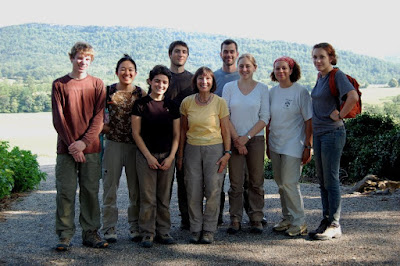Peyre Blanque is also an international fieldschool with students from all over the world.
Students learn prehistoric excavation techniques, from careful exposition of artifacts to systematic detailed drawings (individual excavation units and stratigraphic profiles), and three-dimensional coordinate recording with a total station.
They are also trained in laboratory processing of artifacts (including wet-sieving techniques and flotation), recording (including artifact drawings and site features), and some analytic techniques (such as technological and typological analysis, refitting and petrographic and geochemical sourcing analysis).
Students are given a chance to further participate in the study of the site by collaborating on the analysis of the artifact collections (lithic and bone artifacts, pigments, spatial analysis), or its geological and environmental aspects (charcoal, geology, geomorphology, micromorphology, etc).
Additionally, they are immersed in the current debates and research trends regarding the Late Pleistocene both in the regional framework and in southwestern Europe.
Every week a member of staff or one of our many guests gives a presentation (including on-site presentation) on a topic related to our researches.
Field trips are organized to local raw material sources (in connection with Peyre Blanque), as well as museums and archaeological sites throughout the region, including some of the most impressive prehistoric painted caves such as Niaux and Bédeilhac.
Students not only learn how to identify prehistoric technologies, but they have a chance to try to replicate and use these technologies.
Fieldschool students earn 4-6 credits on this program. Anthropology majors receive credit toward major and minor requirements; in other departments credit towards the requirements of a major or a minor is evaluated by the relevant department.
Students who wish to participate should discuss their intention to participate on the program with all appropriate academic advisors and obtain pre-approvals for courses. They are encouraged to leave a copy of the pre-approval form on file with the Office of International Programs to facilitate receiving credit quickly upon their return.
The program dates for the Field School for 2016 are: July 2nd-July 30th.
Students learn prehistoric excavation techniques, from careful exposition of artifacts to systematic detailed drawings (individual excavation units and stratigraphic profiles), and three-dimensional coordinate recording with a total station.
They are also trained in laboratory processing of artifacts (including wet-sieving techniques and flotation), recording (including artifact drawings and site features), and some analytic techniques (such as technological and typological analysis, refitting and petrographic and geochemical sourcing analysis).
Students are given a chance to further participate in the study of the site by collaborating on the analysis of the artifact collections (lithic and bone artifacts, pigments, spatial analysis), or its geological and environmental aspects (charcoal, geology, geomorphology, micromorphology, etc).
Additionally, they are immersed in the current debates and research trends regarding the Late Pleistocene both in the regional framework and in southwestern Europe.
Every week a member of staff or one of our many guests gives a presentation (including on-site presentation) on a topic related to our researches.
Field trips are organized to local raw material sources (in connection with Peyre Blanque), as well as museums and archaeological sites throughout the region, including some of the most impressive prehistoric painted caves such as Niaux and Bédeilhac.
Students not only learn how to identify prehistoric technologies, but they have a chance to try to replicate and use these technologies.
Fieldschool students earn 4-6 credits on this program. Anthropology majors receive credit toward major and minor requirements; in other departments credit towards the requirements of a major or a minor is evaluated by the relevant department.
Students who wish to participate should discuss their intention to participate on the program with all appropriate academic advisors and obtain pre-approvals for courses. They are encouraged to leave a copy of the pre-approval form on file with the Office of International Programs to facilitate receiving credit quickly upon their return.
The program dates for the Field School for 2016 are: July 2nd-July 30th.
Application deadline: 03/31/2016
Program brochure
For more information about the academic features of this program, please contact Prof. Lacombe (slacombe@binghamton.edu) or Prof. Sterling (sterling@binghamton.edu).







